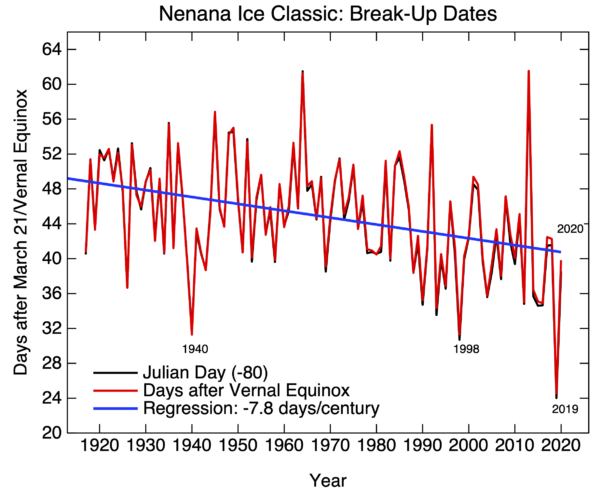Open thread on climate solutions. Please try and stay within a mile or two of the overall topic.
Archives for 2020
‘2040’
After an absurd period with a real-life gloomy corona pandemic, lock-down and unrest, it was quite refreshing to see visions for a sustainable future in a new documentary ‘2040‘ (link to trailer). Its message, through the voice of Damon Gameau, is about hope and is based on rational thinking.
The video takes us to twenty years fast-forward to an imagined future. It makes good use of effects that communicate. For instance, Damon Gameau speaks with children about green and sustainable solutions and then makes the time travel to show what such a future may look like when climate change has stopped.
The documentary also makes use of some cool effects to demonstrate how things work. But it is mostly about a positive message on solutions rather than emphasising climate science and harmful consequences of climate change.
There is an interesting timing with the release of ‘2040’, and hopefully it will contribute to discussions about new solutions and how we can make use of both technology and new behaviour to improve our lives and the health of the planet. This is something that is already being discussed in Europe.
I thought the documentary made some interesting points about energy production, how to make agriculture more sustainable through mixed crops and good soil health, and how to use ocean resources. Another important point is the importance of empowering girls and women. However, I’m not in the position to say how successful the suggested solutions would be. I guess we may know answers in 2040.
Unforced variations: Jun 2020
Unforced variations: May 2020
Nenana Ice Classic 2020
Readers may recall my interest in phenological indicators of climate change, and ones on which $300K rest are a particular favorite. The Nenana Ice Classic is an annual tradition since 1917, and provides a interesting glimpse into climate change in Alaska.
This year’s break-up of ice has just happened (unofficially, Apr 27, 12:56pm AKST), and, like in years past, it’s time to assess what the trends are. Last year was a record early break-up (on April 14th), and while this year was not as warm, it is still earlier than the linear trend (of ~8 days per century) would have predicted, and was still in the top 20 earliest break-ups.

A little side bet I have going is whether any of the contrarians mention this. They were all very excited in 2013 when the record for the latest break-up was set, but unsurprisingly not at all interested in any subsequent years (with one exception in 2018). This year, they could try something like ‘it’s cooling because the break up was two weeks later than last year (a record hot year)’, but that would be lame, even by their standards.
Regional climate modeling and some common omissions
There is a growing need for local climate information in order to update our understanding of risks connected to the changing weather and prepare for new challenges. This need has been an important motivation behind the World Meteorological Organisation’s (WMO) Global Framework for Climate Services (GFCS).
There has also been a lot of work carried out to meet these needs over time, but I’m not convinced that people always get the whole story.
[Read more…] about Regional climate modeling and some common omissions
A problem with YouTube
The American Geophysical Union (AGU) started to stream sessions at their annual meeting in San Francisco a few years ago. This kind of participation over the Internet is a nice alternative since many scholars are unable to attend the AGU meetings due to distance, time constraints, time difference and cost.
Forced variations: Apr 2020
Unforced Variations: Apr 2020
Unbelievably, this is no April’s fool joke
Last week, a colleague shared a tweet with a link to a very unusual paper. I first thought it must be a joke, but then realised that since it was the last days in March when I read it, it could not be an April’s fool joke. It seems to be a serious paper.
So I thought it would be perfect to share the reference McCarthy et al. (2020) today. The paper has a few useful take-home messages, such as the C.R.A.P. framework.
Update: here is a presentation slide deck to accompany the paper.
References
- I.P. McCarthy, D. Hannah, L.F. Pitt, and J.M. McCarthy, "Confronting indifference toward truth: Dealing with workplace bullshit", Business Horizons, vol. 63, pp. 253-263, 2020. http://dx.doi.org/10.1016/j.bushor.2020.01.001